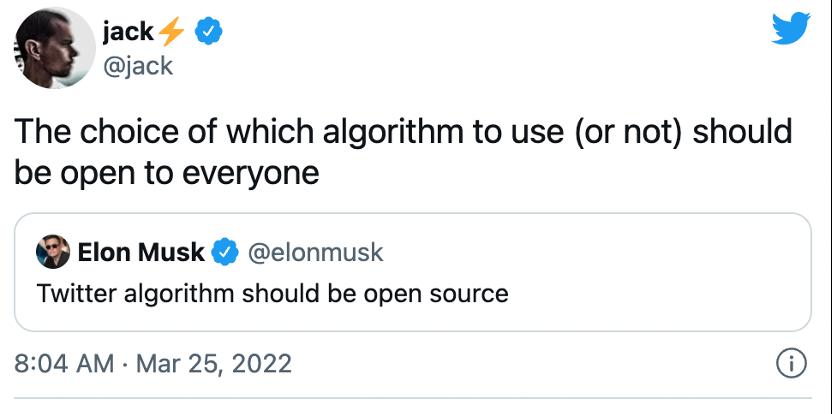"In this age of machine learning, what matters is not algorithms, but data," David Karger, a computer scientist at MIT, said in an interview with WIRED. "What makes Twitter important is not the algorithm, it's the people who tweet." ”
After Twitter accepted a $44 billion acquisition, Elon Musk has laid out a series of grand ideas for Twitter. The most talked about is the "open source algorithm", which some people think will create a fairer world, while others are skeptical about its feasibility.
Musk proposed the plan before his acquisition bid was disclosed, reiterated it on the day his offer was disclosed, and proposed it again after the deal was confirmed.
Musk outlined the proposal in a April 14 TED Talk, "What really matters is that people have both reality and perception, that they are free to speak within the confines of the law." So I think one of the things Twitter should do is open source algorithms. Musk believes that algorithms that disclose escalated or downgraded tweets will reduce the risk of "behind-the-scenes manipulation."
"It has the potential to turn Twitter into a truly trustworthy platform where users can understand why certain tweets appear at the top of the list, and all concerns about behind-the-scenes secrecy or bias will be dispelled," said Marc Linster, chief technology officer at EDB, an open source database company.
Jack Dorsey, a Twitter co-founder and former CEO, is also a clear proponent, arguing that the choice of which algorithm to use or not to use should be open to everyone.

However, the mechanisms for determining the timeline of what Page content is on Twitter are often extremely complex and involve content such as moderation and filtering, paid content promotion, and user analysis. The content behind Tweet rankings, user profiles, algorithm training data, audit rules, and code to train models make up a huge pool of data that is difficult to search and expensive to propagate.
"When we talk about 'algorithms,' it's really a complex combination of data processing and human intervention steps, plus algorithmic models trained using historical data. The open-source version of the core algorithm may not tell us how content on Twitter actually forms, and having code is certainly not enough to really understand how the platform works, as its actual behavior depends on the data entered into it. I don't think twitter is likely to disclose large amounts of this data for obvious commercial reasons, and, for unpublished tweets, this sharing would in many cases violate privacy rules. Michael Rovatsos, director of the Bayesian Centre for Data Science and Artificial Intelligence at the University of Edinburgh, said in an interview with TECH MONITOR recently.
Daan Kolkman, a senior researcher at the Jheronimus School of Data Science in the Netherlands, agrees that open-sourcing the algorithm "seems like a good move," "but in practice, it's likely to be nothing more than a symbolic gesture." It all depends on how accurately it will open source. ”
He explains, "Just accessing the algorithm is not enough to ensure fairness. To perform reliable algorithm audits, you need, among other things, access to the data used to train the model and gain insight into the development process. Twitter's algorithm may be updated frequently, so just having a snapshot isn't all that useful. ”
"In general, recommended models are retrained frequently and change over time. While it's also possible to publish all trained models on an ongoing basis, it won't be useful unless you know exactly what inputs and outputs are used in the model for prediction. Bindu Reddy, CEO and co-founder of ai startup Abacus.AI, said in an interview with The Next Web.
Steve Teixeira, Twitter's vice president of product, also commented from a technical point of view, "You can't simply open source an ML (machine learning) model, just like it's some bubbles that bubble up in order."
At the same time, such open source also has potential risks. On the one hand, this information can be copied by competitors, providing user privacy for cybercriminals. Open source, on the other hand, offers new opportunities to discover vulnerabilities and flaws.